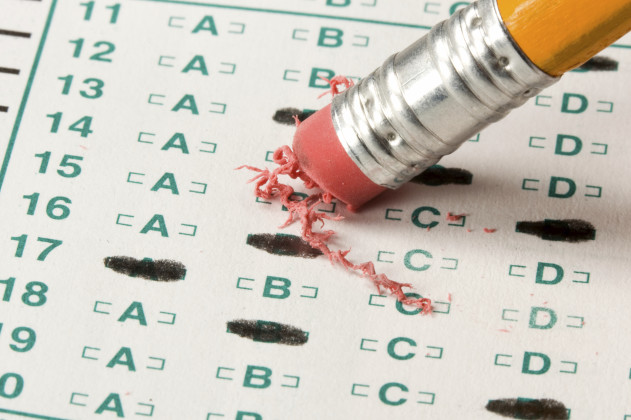I’ll have to keep tapping the optimism of my generation to snuff out the skepticism of his. I’ll have to find a way to convince him that the world needs artists as much as engineers.
My son is getting ready to start his senior year of high school, and despite the looming trifecta for stress (academics, SATs, and college apps), he appears to be holding up well. I wish I could say the same for his father and me.
Through 25 years of marriage, we’ve had our share of conflicts. But Tate’s next step is bringing out a whole new world of head butting.
During dinner conversations, my husband brings up rising tuition rates and the scores of un- or under-employed college graduates grappling with debt. He insists that unless Tate is set on graduate school, a diploma from a liberal arts college isn’t worth the parchment it’s printed on. He tries to steer Tate toward practical fields like STEM (Science, Technology, Engineering, and Math).
Trouble is, my husband, a cinematographer, was an English major. He doesn’t know a polymer from a polygon. When he talks about STEM, he sounds like comedian Sam Hyde who, in his Ted Talk parody, spouted random predictions about sea floor farming and robots policing the streets.
I was an English major too, and though I sometimes wonder how my life (and life savings) might be different had I chosen a more practical path, I staunchly support a liberal arts education. During our dinner-time debates, I maintain that college can be a time to explore a variety of subjects, take risks, get to know yourself. “College is more than job training,” I tell Tate. “The world needs people who know how to think.”
Poor Tate. Despite being recognized at school for his work in science and math, he hangs out in the art room, and spends all his free time playing year-round, competitive tennis. He has no clue what he wants to do. What 17-year-old does?
Tate can’t buy into the messages my generation embraced about following your bliss or contemplating the color of your parachute. When I consider the messages his generation hears, I see thought balloons around “The world is completely screwed” and “Fix it…now!”
When Tate begins to fret about a future at Starbucks, my husband and I finally recognize the pressure we’re putting on him. We agree to limit our dinner conversations to less controversial topics, give Tate some breathing room, and wait to meet with his school’s college counselor.
In the meantime, I lay awake at night, Venn diagrams swirling in my head. I’m looking for that sweet spot where all the circles overlap, and the perfect college emerges in sharp relief. Then I hear about a seven-hour aptitude test that can help simplify decisions about colleges and majors. “It’s not an interest inventory,” I tell Tate, perusing the online brochure. It’s a battery of tests designed to “identify personal strengths” and “point to rewarding careers.” Reluctantly, Tate agrees to take the test.
In the summary session, we learn that Tate’s off-the-chart Rhythm Memory suggests he would make an excellent drummer. He also scores particularly high in Visual Design. The reviewer says, “The more aptitudes you use in your work, the more satisfied you will be.” He asks Tate to name a career that combines sound with visual images. Tate smirks and looks over at his father “Film making,” he says.
My husband has never encouraged Tate to follow in his footsteps. Though he loves his work, it has taken a toll on our family. Long hours, often on location, followed by months of no work at all. When the reviewer mentions other unstable, competitive industries like music video production, animation, and game design, I reach for my husband’s hand, give it a squeeze.
I want to tell him there are worse things in the world, like being miserable, and probably unsuccessful, in a career chosen solely for its ranking in the Occupational Outlook Handbook.
On the drive home, I look over at Tate and smile. “Too bad we sold your drum set,” I say, and he laughs.
“You know what you used to love before tennis stole you heart?”
He looks out the window. “Don’t say…”
“Art,” we say at the same time.
I remind him of his early passion for drawing, all the comic books he designed, the videos and short films he has made over the years.
He rolls his eyes, but I know he’s listening because his ear buds are still in his lap. His shoulders relax a little; he sits back in his seat.
I mention something I read recently about a movement called STEAM: STEM with Art and Design added to the mix. The theory is that Art and Design will transform the 21st century economy.
“And who came up with that idea?” Tate asks, derisively. “The Rhode Island School of Design?”
I don’t want to tell him that it actually was RISD. “Who cares?” I say. “It’s a movement we can get behind!”
He shrugs, shakes his head. I’ll have to keep tapping the optimism of my generation to snuff out the skepticism of his. I’ll have to find a way to convince him that the world needs artists as much as engineers.
That night in bed I stare at the ceiling, circles swirling in my head, none of them intersecting. A circle around Tate’s measly college fund. Circles under my eyes. I can’t stop thinking of Maggie, the well-educated barista who made my latte that morning. Smiling, she slid the mug across the counter, and I peered inside. Staring back at me was a perfect, hand-poured heart. A true work of art.
Rebecca Lanning lives and writes in Chapel Hill, NC. Her recent work has appeared in Brain, Child Magazine, The Washington Post, and 27 Views of Carolina Friends School. She was a 2014 cast member of Listen to Your Mother, Raleigh-Durham.
Related Links:

